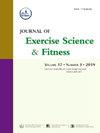Cross-lagged analysis of mobile phone addiction, bedtime procrastination, and exercise self-efficacy among university students
IF 2.4
2区 医学
Q2 SPORT SCIENCES
引用次数: 0
Abstract
Purpose
Exercise self-efficacy refers to an individual's cognitive ability to believe that they can accomplish the goals and tasks of physical activity, which is particularly important for developing physical and mental health. Therefore, this study aimed to investigate the association between mobile phone addiction, bedtime procrastination, and exercise self-efficacy among college students, and to provide intervention directions and theoretical insights for developing college students' physical and mental health.
Methods
Using the College Students' Mobile Phone Addiction Scale, the Bedtime Procrastination Scale, and the Exercise Self-Efficacy Scale, a longitudinal follow-up survey of 407 college students in provinces X and Y was conducted at 3-month intervals in May 2024 (T1) and August 2024 (T2) to analyze the mechanism of the interaction between the College Students’ Mobile Phone Addiction Scale, the Bedtime Procrastination Scale and the exercise self-efficacy using cross-lagging.
Results
There was no significant difference between mobile phone addiction, bedtime procrastination, and exercise self-efficacy among college students in terms of gender, academic year, and age. It was found that T1 mobile phone addiction positively predicted T2 bedtime procrastination (β = 0.15, p < 0.05), while T1 bedtime procrastination positively predicted T2 mobile phone addiction (β = 0.15, p < 0.001), indicating that mobile phone addiction and bedtime procrastination predicted each other temporally. In addition, T1 bedtime procrastination negatively predicted T2 exercise self-efficacy (β = −0.10, p < 0.05) and T1 mobile phone addiction negatively predicted T2 exercise self-efficacy (β = −0.12, p < 0.05).
Conclusion
There was a longitudinal predictive relationship between cell phone addiction, bedtime procrastination, and exercise self-efficacy; cell phone addiction and bedtime procrastination predicted each other; bedtime procrastination predicted exercise self-efficacy; and cell phone addiction predicted exercise self-efficacy.
大学生手机成瘾、睡前拖延症与运动自我效能感的交叉滞后分析
运动自我效能感是指个体相信自己能够完成体育活动的目标和任务的认知能力,这对发展身心健康尤为重要。因此,本研究旨在探讨手机成瘾、就寝拖延症与大学生运动自我效能感之间的关系,为促进大学生身心健康提供干预方向和理论见解。方法采用《大学生手机成瘾量表》、《就寝拖延量表》和《运动自我效能量表》,于2024年5月(T1)和2024年8月(T2)每隔3个月对X、Y两省407名大学生进行纵向随访调查,采用交叉滞后法分析《大学生手机成瘾量表》、《就寝拖延量表》与运动自我效能的交互作用机制。结果大学生手机成瘾、就寝拖延、运动自我效能感在性别、学年、年龄上均无显著差异。结果发现,T1期手机成瘾正预测T2期睡前拖延症(β = 0.15, p <;T1睡前拖延症正向预测T2手机成瘾(β = 0.15, p <;0.001),表明手机成瘾和睡前拖延症在时间上是相互预测的。此外,T1睡前拖延症对T2运动自我效能负向预测(β = - 0.10, p <;0.05), T1手机成瘾负向预测T2运动自我效能(β = - 0.12, p <;0.05)。结论手机成瘾、就寝拖延症与运动自我效能感存在纵向预测关系;手机成瘾和睡前拖延症相互预示;睡前拖延症预测运动自我效能;手机成瘾预示着运动自我效能。
本文章由计算机程序翻译,如有差异,请以英文原文为准。
求助全文
约1分钟内获得全文
求助全文
来源期刊
CiteScore
5.10
自引率
3.60%
发文量
54
审稿时长
31 days
期刊介绍:
The Journal of Exercise Science and Fitness is the official peer-reviewed journal of The Society of Chinese Scholars on Exercise Physiology and Fitness (SCSEPF), the Physical Fitness Association of Hong Kong, China (HKPFA), and the Hong Kong Association of Sports Medicine and Sports Science (HKASMSS). It is published twice a year, in June and December, by Elsevier.
The Journal accepts original investigations, comprehensive reviews, case studies and short communications on current topics in exercise science, physical fitness and physical education.

 求助内容:
求助内容: 应助结果提醒方式:
应助结果提醒方式:


